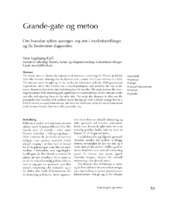| dc.contributor.author | Fjell, Tove Ingebjørg | |
| dc.date.accessioned | 2020-03-12T14:54:08Z | |
| dc.date.available | 2020-03-12T14:54:08Z | |
| dc.date.issued | 2019 | |
| dc.Published | Fjell TIF. Grande-gate og metoo. Om hvordan rykter sprenger seg inn i mediefortellinger og får bestemme dagsorden. Tidsskrift for kulturforskning. 2019(1):59-81 | eng |
| dc.identifier.issn | 1502-7473 | |
| dc.identifier.issn | 2387-6727 | |
| dc.identifier.uri | https://hdl.handle.net/1956/21479 | |
| dc.description.abstract | The article aims to discuss the expression of rumours, concerning the Venstre politician Trine Skei Grande, claiming that she had sex with a drunk 16–17 year old boy in a field. The rumours were brought up in the media, in connection with the 2018 government negotiations, where Skei Grande was a central participant, and probably also due to the metoo dicussions that at the time had taken place for months. The study analyses the wavering movement, from attaching great significance to trustworthiness in the rumours on the one side, and rejecting them on the other side. The study also discusses in what way the presumed event (woman with political power having sex with a drunk teenage boy in a field) is viewed as sexual harrassment, and how the traditional script for sexual harassment (male harasses female) funtions in this particular case. | en_US |
| dc.language.iso | nob | eng |
| dc.publisher | Novus | eng |
| dc.relation.uri | http://ojs.novus.no/index.php/TFK/article/view/1692 | |
| dc.rights | Attribution-ShareAlike CC BY-SA | eng |
| dc.subject | rumour | eng |
| dc.subject | script | eng |
| dc.subject | sexual harassment | eng |
| dc.subject | metoo | eng |
| dc.subject | gender | eng |
| dc.title | Grande-gate og metoo. Om hvordan rykter sprenger seg inn i mediefortellinger og får bestemme dagsorden | eng |
| dc.type | Peer reviewed | |
| dc.type | Journal article | |
| dc.date.updated | 2019-11-26T09:52:19Z | |
| dc.description.version | publishedVersion | |
| dc.rights.holder | Copyright the author | eng |
| dc.identifier.cristin | 1724509 | |
| dc.source.journal | Tidsskrift for kulturforskning | |
